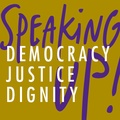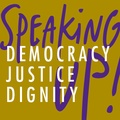Read Part 2 >>
The word “rape,” the word “murder,” the word “horror,” the word “atrocity,” the word “massacre,” none can adequately describe ‘that for which there is no word.’ Minnie Vautrin and Iris Chang were both, in the end, swallowed up in the quick sand. Iris Chang, a young woman of thirty-six committed suicide in 2004, driving away from home at 3:00 a.m. with a revolver, leaving a two-year-old son and a husband. I am told by a friend who knows a friend who knows the family of Iris Chang—three degrees of separation—that her suicide was not the result of her work on her book or the controversy that followed it, and I tiptoe away now from intruding further on her personal story.
Minnie Vautrin returned to America in 1940 when her health broke down. A year after she left Nanking, on May 14, 1941, she turned on the gas in her apartment and the Goddess of Nanking was dead.
I haven’t been able to sit still since becoming acquainted with her. I have come too late as she stands in the kitchen with her hand on the knob of the gas stove. Her apartment door is sealed shut. However loudly I knock, she will not let me in and whatever I say will not convince her. But I long to have her take one last look and glimpse for a moment what others see. Her life. Her legacy. Her great good work. Thousands live today because of her. Yet I imagine it’s the other thousands and thousands who could not be saved who haunted her. The little girls crying, “Mie jing. Mie jing.”
The photos do not leave me—the rows of decapitated heads, the bodies of women on the steps, their legs splayed open, the bayonet in the vagina. I have seen in my mind’s eye the babies tossed in the air, landing on bayonets, thrown into graves, toddlers watching uncomprehending, a grandmother shielding her young grandchild with her life. I have heard the soldiers’ eerie laughter, watched them from my distance as they stand around joking in the midst of their killing games.
Who are these men without conscience? What is their culture? How does this happen?
It is late in the day of the rising sun. I am seeking the sleeping children of Japan, urging them to open their eyes, to hurry to the internet if not their history books so that they may see the familiar face of a grave incomprehensible danger within the human condition, waiting, lurking, lulling all deniers of every nightmare to heavier sleep. The children of Germany wakened to the Holocaust into which they were born. They lowered their eyes, red and salty with weeping, and stood naked before the horror that resides among us. There it remains ready to spring upon us as we sleep, because we sleep.
Minnie Vautrin, the Goddess of Nanking, who faithfully laboured in the worst of all possible worlds, wrote of how ashamed the mothers and wives would be if they knew. She needed us then, she needs us now to come and stand with her, beside her, in front of the demons, our fathers and grandfathers, our neighbours, our own. Throughout time she has needed us, each of us. We are not to shrink from knowing what she knew. Her snapshots could not be put away in a box on the shelf. She could not take a break, go out to the pachinko parlours or to sing karaoke with friends, and return later to pace the floor. There was no escape for her in the vortex. She did what she could, slept when she could no longer keep on, she would have prayed and prayed, begged her God for help. In the end, she welcomed death in a world so absented by the Mighty-to-Save in whom she trusted and to whom she had given her all.
In such a world, the question remains. Where was God for Minnie Vautrin? Children of Japan, grandchildren, my fellow relatives of the rapists of Nanking, are we not each the vehicle of her hope?
Let’s suppose that the powerless God posited by the theologians of our day, the One who weeps, is not absent. They, the Christian theologians, tell us that God was hanging, writhing from the gallows. God was a ten-year-old boy, not heavy enough and therefore suffocating slowly to death in Auschwitz.
Here in this morning’s wedge of solitude, I can pray “Lead us not to the test” while knowing that Minnie too, like the child God in Auschwitz, was abandoned at the abyss. From this great distance as I nibble on my stash of toasted almonds and bitter-sweet dark chocolate wafers, I am watching as she walks to the stove in her apartment. She, Goddess of Nanking, was as powerless to save Minnie Vautrin as the mighty God of Abraham was powerless to save a ten-year-old boy on a gallows in Auschwitz.
And still I trust the One who weeps. The small child choking, the man on that tree those years ago, the brave woman shorn of her hope—these powerless ones who weep, reside among us, within us, towards us and will not let us go. God/dess who walks steadfastly our way and stays with us forever, I still trust. The powerlessness is, in spite of all the evidence, the power. It will draw forth the strength within us to end that for which there is no word.
This is not a gentle walk to Nagasaki. I did not know when I set out that I would be meeting Minnie Vautrin here in this moment, in her apartment. I am scraping the walls of my mind looking for some way, a toe-hold, a tiny squiggle of meaning, anything, anything. Crawling away from the edge of the quicksand, grabbing at tree roots, I hear her crying out, “Mie jing! Mie jing!” begging for a rope as she sinks inexorably in the weight. If I could I would lasso her absent God and her unanswered prayers. For a moment, before the gas moves into her lungs, could we find a space, a pause? Is there still choice, Minnie? Or is it that humans are sometimes without agency, as prey to storms within as we are to storms without, and that the forces of violence sometimes rush untrammeled through us? Of such moments, could we not say, “It was beyond our control”? Could we not say, as you stand there, that a gigantic force has been let loose from the inaccessible deep vault of magma that lies buried beneath consciousness? And could we not imagine that an unstoppable tsunami, a volcanic eruption, a devouring dwarf star, a storm like no other befell Nanking and that you, who rescued so many, were also in the end swept away? Just suppose that we could look on Nanking, on Nagasaki, on Auschwitz, on other human catastrophes in somewhat the same way that we look at other great natural catastrophes. Are we not also beings of nature with our vast unfeeling and unknowing and our capacity to inflict suffering?
The long march to disaster begins long before it begins. We hardly know what is happening until it becomes a cataclysm and we find ourselves trapped as caged animals. We understand so little that we fail and fail to heed warning signs. The elephants know better. They feel the rumbling. Deep, deep down. Still far enough away. Rush now, rush, to higher ground.
What if, dear Goddess of Nanking, we were to respond to the seething magma within the human condition as we do to the violence in nature, plunge as you did into the rescuing, get cell phones to the people living on the shore to alert them that the tsunami is on its way, watch for the signs in society that signal steps on the march to genocide—the singling out of others into the undesirable “them,” the finger-pointing, the slow dehumanizing that begins so subtly that we hardly know the tectonic plates are starting to shift. “Oh, did you smell those people? Who are they?” We are upgrading the buildings of the cities along the western coast to make them safer in the earthquake to come. Evacuation plans are moving into place. We watch for the signs of a looming pandemic. We do not curse the virus. We do not war with the sea. Before the contagion arrives we allocate resources to unmask and name its mysteries. Once it is upon us, we move to quarantine the diseased. We apply our vast energies, our microscopes, our minds, in collaborative labour to contain the danger, to recognize earlier and earlier warning signs. What if we were to do less of what does not work, less torturing of prisoners, less of “an eye for an eye,” and move instead to create global laws to intervene, to protect a populace facing slaughter? We have yet to prevent governments and demagogues from devouring their own people. But some day, Minnie, some day.
Since our expulsion from Eden, the Gardener has given us hands as tools, minds as tools, bodies as tools. Dear Minnie, as you choose to discard your holy body, can you not see what a worthy, what an excellent tool it has been? You were taught, as was I, that our task is to do as you did, to rescue the perishing, care for the dying. If we could apply ourselves to that and not spend so much energy in the aftermath of the storm to punish or curse the sea, Minnie, if you could be released in this moment from blaming or forgiving anyone, including yourself, would you linger with us longer?
As you seal your door and the windows, even as the devouring is upon you, could you pause to take one full, deep breath and say to yourself now, that nothing, nothing, nothing at all is required? What if, dear Minnie, we could enter a time before time in which neither good nor evil, praise nor condemnation existed? What if there is only tragedy and comedy, the light and the shadow? Dear light dweller, life breather, is it not enough that you carried the Light where light as we know it had not yet come?
My futile pleading, my piece of rope frays as you sink in the quicksand. It does not hold. Still, I will toss these bits of straw your way and suggest that we return the task of judging what is good and what is evil, at least in this moment, to the Judge and source of judgment. I leave you now, although you do not leave me, and tiptoe on down the road toward the house and to the mountain where lava erupts. I will look to the Maker to carry the burden of evil. And as I think this thought, I am surprised by an insect moving along the wall.
Goddess of Nanking, trust is the only safety zone I know. Whether in the quicksand or in your apartment, I am not released from the task as assigned. I will keep trusting. And I must be on my way to Nagasaki.CC
* “From Gently to Nagasaki” was first published in The Asian American Literary Review , Issue 2. AALR is a not-for-profit literary arts organization. To learn more about it or purchase a subscription to the journal, visit online at www.asianamericanliteraryreview.org, or find them on Facebook.
© 2011 Joy Kogawa






